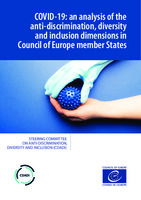COVID-19: an analysis of the anti-discrimination, diversity and inclusion dimensions in Council of Europe member States

com document
Συγγραφέας
Council of Europe
Ημερομηνία
2020-11Θεματικές επικεφαλίδες
Covid-19 ; Public Services ; Anti-Discrimination ; Human rightsΠερίληψη
Crisis times are times of uncertainty and fear. The Covid-19 outbreak brought
back such times. Faced with unprecedented risks to public health and the safety
of their populations, States have taken extraordinary measures to contain the
pandemic, including in some cases formally derogating from their obligations
under the European Convention on Human Rights. People had to drastically
change their way of living and adapt to new circumstances. Maintaining physi-
cal distance, job uncertainty, telecommuting for work or school (for those who
could), not being able to cross borders: these new ways of living would have
been unthinkable at the beginning of 2020.
Still today it is not known when this pandemic will end or how it will end.
What is evident so far is that Covid-19 has had wide-ranging effects on our
societies. And these effects go well beyond the health crisis it provoked. The
economy is facing a historic recession. Alerts have been raised about unprec-
edented democratic setbacks in some cases. Human rights concerns have been
reported over some States’ responses. Covid-19’s implications for the economy,
democracy and human rights continue to be thoroughly discussed in national
and international fora. Perhaps less explored is the question of dealing with
diversity in responding to Covid-19. And, in particular, how the distinct impact
of the crisis on different communities has been dealt with by States.
